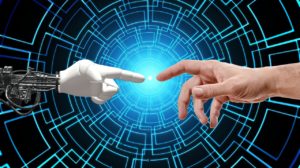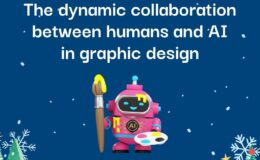Could Healthcare Be The First Industry To Have AI “Colleagues”?
 AI systems detecting cancerous tumours and robots assisting surgeons in operating theatres sounds like a scene in a science-fiction film; but, in less than a decade, this could become reality. The healthcare industry is slowly, but surely, heading for digitalisation as governments and medical experts recognise the potential of AI in saving lives.
AI systems detecting cancerous tumours and robots assisting surgeons in operating theatres sounds like a scene in a science-fiction film; but, in less than a decade, this could become reality. The healthcare industry is slowly, but surely, heading for digitalisation as governments and medical experts recognise the potential of AI in saving lives.
At the beginning of August, the health secretary, Matt Hancock, announced plans for £250m funding for the NHS to set up a national artificial intelligence lab. Support for the digitalisation of the healthcare industry is growing steadily as AI has proven useful and delivered results, particularly in image-based diagnostics.
We have worked with clients in healthcare for nearly 30 years, and the potential for big change in the industry is very exciting. Not only because the use of AI in the healthcare sector has the potential to positively benefit so many lives, but it will also spur the growth and numbers of truly innovative businesses developing and using AI as we move towards industry 5.0.
The challenges facing developers of AI and healthcare providers who want to fully integrate AI into their practices are public distrust and the public’s lack of knowledge on how the technology works. Unfortunately, there has been a massive amount of scaremongering and negativity around AI which has influenced public opinion to the extent that the majority of people see AI as a threat to their privacy or livelihoods.
There is currently a critical need for increased use of AI systems in healthcare to support doctors and medical specialists with ever-increasing workloads and the need to ease this pressure only increases as the population ages. The older generation has the most need of healthcare services but, while younger generations are more used to digital innovation and would likely welcome new technological developments in healthcare, the older generation will be the hardest demographic to convince of the effectiveness of AI, despite its proven potential.
However, the upside to a slow and cautious approach to integrating AI into healthcare is that issues such as ethical usage, data protection, cyber-security and staff training are taken seriously, which should minimise any risks.
Most of the fear around AI appears to be centred on whether we can trust the technology, but a leap into industry 5.0 for the healthcare sector could help to ease this fear.
Industry 4.0 – which we are currently in – saw the birth of intelligent autonomous systems that use data and machine learning, including AI. AI is capable of ‘learning’, but it has to be ‘taught’ (fed data). Currently, we treat AI too similarly to standard computers – using AI mainly to gather information and sort data – and so far, we have only scratched the surface of the potential of AI.
Experts predict that, in the next 10-15 years, we will move into Industry 5.0 which will see AI and humans working together, alongside each other, as a team. This is called “Human-AI teaming” and suggests that AI should be treated more like a human colleague than a machine. We need to be able to trust that AI systems are not biased or flawed, but the fact that medical professionals will be working alongside AI should ease public concerns over risks of mistakes.
Human-AI teaming could also shift public opinion to accept AI in healthcare. A study led by researchers from the University of Westminster, Acceptability of Artificial Intelligence (AI)-led chatbot services in healthcare: A mixed-method study, received feedback from participants that chatbots lacked empathy, a trait that is highly valued when dealing with sensitive issues such as medical or mental health concerns.
AI should not replace medical staff, but a partnership between an empathetic medical doctor and super-intelligent AI should offer the best of both worlds and the best treatment for patients.
The healthcare industry has been lagging behind in making use of new technology, as mistakes come with high consequences. Perhaps with the development of an AI lab, healthcare could be the first sector to adopt “Human-AI teaming” and to move into Industry 5.0.

By Georgina Bull
Senior PR Account Executive








